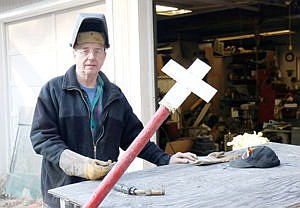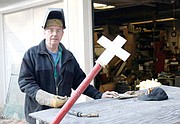Reminders of highway safety
For most Montanans cars are a necessity. They allow the great distances often separating them from their work, school or family to be covered in the fourth largest state in the union.
The activity becomes so routine drivers sometimes need little reminders of the dangers posed while traveling Montana’s roadways, enjoying the scenery and listening to Hank Williams on the radio.
In Lincoln County, the American Legion Post No. 97 maintains the roadside markers that serve as a warning of the fatalities that have happened on the county’s major roadways.
“I’ve built a multitude of crosses over the last several years. About four years ago we put in 13 crosses, that was a really bad year,” Commander of Post 97 Larry King said.
King got involved with the program around six years ago as a helper for Walter Wuest, who recently passed away. “Pretty soon he got too old to do it. Basically, I had the welder and a place to do it, so I kind of took over,” said King.
The statewide program that started in 1953 continues through the work of Montana’s 134 American Legion posts that get the names of victims and the locations of accidents from the Montana Department of Highways. Then on the Sunday before Memorial Day Libby Legionnaires and other volunteers strike out across the county to install new markers and spruce up and replace old ones.
One of the volunteers for the annual maintenance operation is legion member Rich Darsow. “Oh gosh, I’ve probably been involved for 20 years. It was one of the reasons I got involved with American Legion,” he said. “We strip them, clean them, paint them and put them back up. The theory is to warn people of dangerous stretches of highway, but it’s surprising how many are on straight stretches.”
King said he knows many of the stories behind the markers, but doesn’t want to bring them up and remind those who have lost loved ones of their tragedies. He did mention several fatalities involved vehicles striking wildlife in the area and can rattle off the mile-markers where many of the crosses are near in the surrounding area.
Another reason why Montana’s highways can be deadly is the response time for accidents are greatly increased in rural settings, with long stretches of highway between emergency response locations. Driving with a blood-alcohol level above .08 was a factor in 89 of Montana’s 205 fatalities in 2012, according to a comprehensive United States Department of Transportation report.
The University of Minnesota’s Center for Excellence in Rural Safety has cited United States Highway 2 as one of the more dangerous stretches of highway in the nation for many of the reasons listed above.
King said there are approximately 30 markers on his route that runs from Libby to the weigh station, down Highway 56 and back. He guesses there are around 100 crosses in Lincoln County maintained by American Legion and doesn’t believe there are any new ones needed so far this year. He says about 15 people join the group every year on maintenance day, which is followed by a steak fry at J. Neils Park.
Montana Machine and Fabrication has donated the flat bar for the crosses for several years and most of the posts are from four or five foot chunks salvaged from the Champion Mill when it closed.
King takes great pride in his work. He said the markers in Lincoln County are better maintained than others he has seen around the state. “I take a lot of pride in trying to make a nice cross,” he said. King welds the crosses in his shop behind his blue house just south of town. His workstation is quickly assembled and he churns out about 25 at a time.
Over the years King has modified his process to make the crosses easier to repaint. “I weld a little plug on the end of the post and then weld the cross right on top of it instead of splitting the post and putting the cross down in there,” he said.
King said the politically correct term for the crosses is “markers”, and they’re not memorials they’re “reminders.” Either way, they represent lives lost. And someone knows the name behind each cross.



